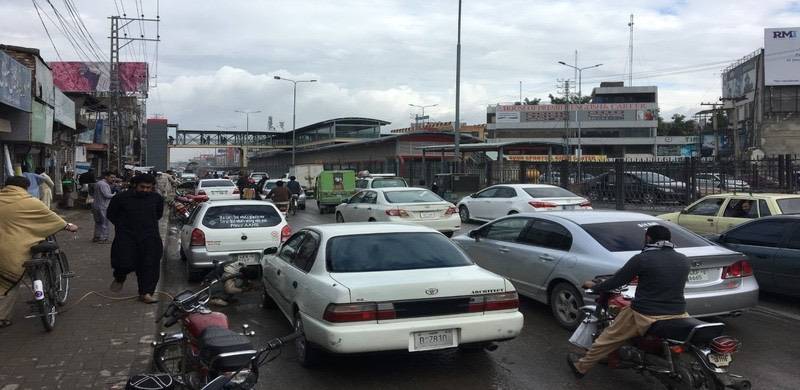
Traffic congestion on the roads of Khyber Pakhtunkhwa’s capital of Peshawar is worsening day by day. The daily number of vehicles is more than seven times the capacity of the city’s roads.
Danish, a student of University of Engineering and Technology (UET), Peshawar, told The Friday Times that he had been suffering due to traffic jams for the past couple of months.
He added that he was almost half an hour late for his classes, in spite of the fact that he had tried different routes to reach his university.
Muhammad Rasool, a taxi driver, stated that due to congestion on the roads, cabs consume double the fuel as they did earlier.
Umar Gul, the owner of Shahid and Brothers Electronics on University Road Peshawar, identified the Bus Rapid Transit (BRT) project as the cause of the increase in the severity of traffic jams and devastation to the city’s service roads.
The Friday Times also spoke with Peshawar Development Authority (PDA) Director Roads Imtiaz Hussain, who remarked that a committee had already been formed under the special directives of the chief minister to resolve the issue.
He added that the committee comprised of the Secretary of Transport, Deputy Commissioner Peshawar, Deputy Director Roads PDA, Officials of Urban Planning Unit (UPU) and the Regional Transport Authority (RTA) along with traffic police officials.
Hussain remarked that according to a survey conducted in 2015, the capacity of municipal roads of University Town was 2-3000 vehicles per day while the University Road had the capacity of accommodating 15,000 cars a day.
He also added that the main roads of Peshawar had the capacity of 100,000 vehicles. As per Hussain, a new survey about road capacity was due to be conducted after the completion of the BRT project.
In a session with Traffic Police Deputy Director Muhammad Ashfaq Afridi, it was revealed that there was no exact figure available about the numbers of vehicles running on the roads of Peshawar.
However, according to recent estimates, 0.7 million vehicles checked into Peshawar every day from the Khyber Pass, Islamabad-Peshawar Motorway, Charsadda, and Nowshera roads.
He shared that the number of vehicles registered with Excise Department included 325,000 motorbicycles, 126,000 motorcars, 30 thousand small wagons, 1,000 ambulances, 10,000 Qingqis and 30,000 rickshaws.
Afridi revealed that despite only 30,000 rickshaws being registered, 60,000 rickshaws were running on the roads of Peshawar.
The Traffic Police Deputy Director further added that the capacity of the roads inside Peshawar was not up to the mark, adding that following the BRT project, the roads would be narrowed while service lanes had also been removed.
Afridi also stated that encroachments, illegal vehicle-stands, and a lack of parking areas were also making the situation worse.
He added, ‘‘It is the responsibility of PDA to keep a check on parking lots and illegal stands.”
An official on the condition of anonymity told The Friday Times that RTA Peshawar had issued route permits to 32,631 vehicles, including 24,614 rickshaws, 5,701 yellow–cabs, 1,146 minibuses, 526 buses and 644 wagons.
Danish, a student of University of Engineering and Technology (UET), Peshawar, told The Friday Times that he had been suffering due to traffic jams for the past couple of months.
He added that he was almost half an hour late for his classes, in spite of the fact that he had tried different routes to reach his university.
Muhammad Rasool, a taxi driver, stated that due to congestion on the roads, cabs consume double the fuel as they did earlier.
Umar Gul, the owner of Shahid and Brothers Electronics on University Road Peshawar, identified the Bus Rapid Transit (BRT) project as the cause of the increase in the severity of traffic jams and devastation to the city’s service roads.
The Friday Times also spoke with Peshawar Development Authority (PDA) Director Roads Imtiaz Hussain, who remarked that a committee had already been formed under the special directives of the chief minister to resolve the issue.
He added that the committee comprised of the Secretary of Transport, Deputy Commissioner Peshawar, Deputy Director Roads PDA, Officials of Urban Planning Unit (UPU) and the Regional Transport Authority (RTA) along with traffic police officials.
Hussain remarked that according to a survey conducted in 2015, the capacity of municipal roads of University Town was 2-3000 vehicles per day while the University Road had the capacity of accommodating 15,000 cars a day.
He also added that the main roads of Peshawar had the capacity of 100,000 vehicles. As per Hussain, a new survey about road capacity was due to be conducted after the completion of the BRT project.
In a session with Traffic Police Deputy Director Muhammad Ashfaq Afridi, it was revealed that there was no exact figure available about the numbers of vehicles running on the roads of Peshawar.
However, according to recent estimates, 0.7 million vehicles checked into Peshawar every day from the Khyber Pass, Islamabad-Peshawar Motorway, Charsadda, and Nowshera roads.
He shared that the number of vehicles registered with Excise Department included 325,000 motorbicycles, 126,000 motorcars, 30 thousand small wagons, 1,000 ambulances, 10,000 Qingqis and 30,000 rickshaws.
Afridi revealed that despite only 30,000 rickshaws being registered, 60,000 rickshaws were running on the roads of Peshawar.
The Traffic Police Deputy Director further added that the capacity of the roads inside Peshawar was not up to the mark, adding that following the BRT project, the roads would be narrowed while service lanes had also been removed.
Afridi also stated that encroachments, illegal vehicle-stands, and a lack of parking areas were also making the situation worse.
He added, ‘‘It is the responsibility of PDA to keep a check on parking lots and illegal stands.”
An official on the condition of anonymity told The Friday Times that RTA Peshawar had issued route permits to 32,631 vehicles, including 24,614 rickshaws, 5,701 yellow–cabs, 1,146 minibuses, 526 buses and 644 wagons.

